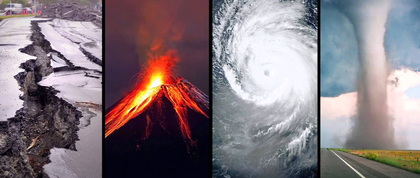
Source: American Museum of Natural History
Research and funding priorities tend to shift from one disaster to the next, which has resulted in a sparse evidence base and hampers the nation’s ability to respond to public health emergencies in the most effective way, says a new report from the National Academies of Sciences, Engineering, and Medicine.
The report is co-authored by David Abramson, PhD, clinical associate professor at NYU School of Global Public Health and the director of the research center on Population Impact, Recovery and Resilience (PiR2), who served on the National Academies’ Committee on Evidence-Based Practices for Public Health Emergency Preparedness and Response.
The report, Evidence-Based Practice for Public Health Emergency Preparedness and Response, is the culmination of a three-year study sponsored by the Centers for Disease Control and Prevention (CDC) about the strength of research regarding public health emergency preparedness and response. It recommends the creation of a National Public Health Emergency Preparedness and Response Science Framework to establish a sustained research agenda and the necessary infrastructure to advance understanding of what works and why in disaster preparedness and response.
“Emergencies and disasters are complex problems,” said Abramson, “and they require complex solutions built on systematic evidence and research. Too often the research community finds itself conducting ‘one-off’ studies about specific disaster events, such as Hurricane Katrina, Ebola, or now COVID-19, without the funding support to develop more generalizable knowledge. The National Academies’ study highlighted the urgent need for an infrastructure to support this evolving scientific discipline, encompassing research funding, training grants, and agenda-setting.”
In the aftermath of Sept. 11, 2001, the CDC and other organizations have invested billions of dollars in the nation’s public health emergency preparedness and response infrastructure, systems, and science. From the ongoing COVID-19 pandemic to hurricanes and wildfires, public health emergencies are increasing in number and severity, due to factors like climate change and global migration patterns. Each emergency presents an opportunity to observe, learn, and conduct real-time research, but a sustained mechanism is needed to capture evidence from these experiences, and translate that evidence to future policy and practice.
The committee developed a methodology for reviewing and evaluating the evidence behind public health emergency preparedness and response practices. While the review was not conducted in response to any specific public health emergency, including the COVID-19 pandemic, the committee studied several practices relevant to COVID-19, including implementing a quarantine to reduce or stop the spread of a contagious disease.
Despite an increase in studies over the last two decades, the body of research on public health emergency preparedness and response remains overwhelmingly descriptive and lacks objective evaluations based on validated measures that can support conclusions on the effectiveness of different practices. The committee concluded that the science underlying the nation’s response to public health emergencies is seriously deficient, which hampers the nation’s ability to effectively respond to emergencies, save lives, and preserve well-being.
NYU’s PiR2 disaster science research center is one of only a handful of such academic centers in the country. In addition, the School of Global Public Health is among the only schools to offer an Advanced Certificate in Disaster Science, Policy, and Practice, co-directed by Abramson and Robyn Gershon, DrPH. Together, the research center and certificate program support the evolving discipline of public health disaster science and the workforce needed to sustain it.
To learn more about the National Academies of Sciences, Engineering, and Medicine report, view the press release, report highlights, and report recommendations.
Press Contact
Rachel Harrison
rachel.harrison@nyu.edu